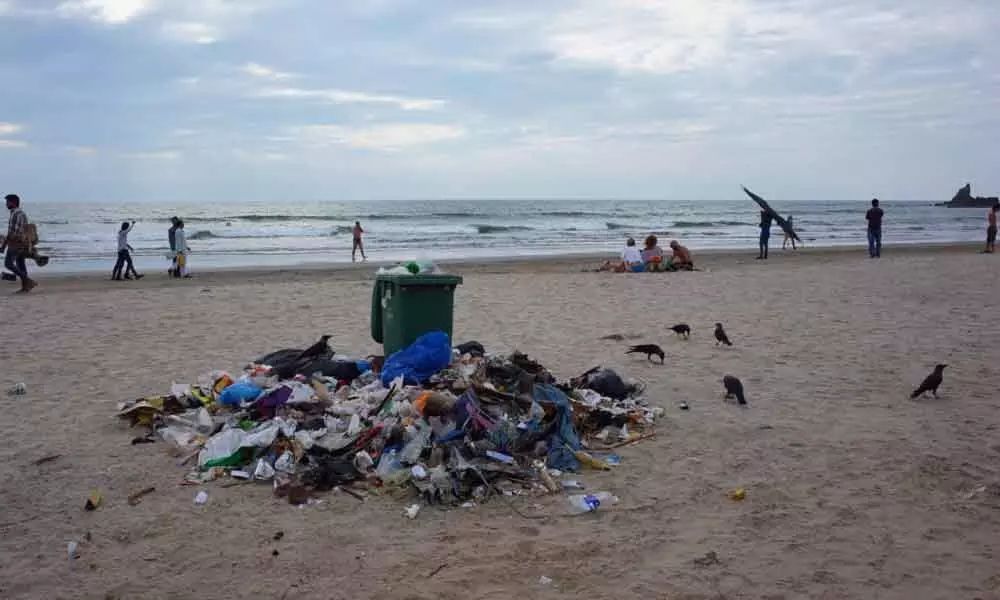Travel, but do no Trash

On a recent popular trek in the Himalayas, I found myself standing on the summit of a ridge and looking at the majestic view of the snow-capped Himalayan ranges perched against the distant horizon under a deep blue sky.
On a recent popular trek in the Himalayas, I found myself standing on the summit of a ridge and looking at the majestic view of the snow-capped Himalayan ranges perched against the distant horizon under a deep blue sky. However as I looked down into the valley side of the ridge, my heart sank at the sight of beer bottles and cans, plastic plates and cups, chocolate wrappers, juice and chips packets all strewn on the green grass.
This littering has unfortunately has become a common sight; all the tourist spots in our country are silently bearing the brunt of irresponsible tourism.
The most popular case of irresponsible-travel in recent history is that of the Mount Everest trek. 24,000 pounds of garbage were recently removed from Mount Everest. To date, more than 5000 men and women have climbed to the peak of the world's highest mountain. And all of them have brought many pounds of gear with them to enable their weeks-long ascent to Everest's summit. But what goes up does not necessarily come down. "You don't need a map to get to the Everest base camp, just follow the trash", says climber Dragana Rajblovic. Heights of Irresponsible travel!
So what can and needs to be done? How to be a responsible traveller?
First and foremost one needs to watch his/ her waste, especially plastic waste. There are some pretty simple things one can do to manage waste like pack reusable bags, use a water filter and a reusable bottle, pack reusable cutlery to carry food instead of getting them packed in Styrofoam boxes.
Watching your waste is one thing, but it's also important to note that travellers shouldn't leave any footprint in the natural places they visit. Leave no trace, only footprints. Whether you're exploring the a rainforest or a city – the leave no trace mantra applies. Whatever waste you bring into the forest or natural environment, make sure you pack it out with you. Don't bring shells back from the beach, or plants from the forest. Also don't deface property: Whether manmade or natural, do not carve your name or write anything – anywhere.
Being a responsible traveller also means supporting the local economy by buying locally grown / made products. It contributes to the local economy and makes a positive impact on the lives of the residents in that place. Volunteering one's time and intellectual capital (like teaching English to local children), and donating some money to reputable local causes is another great way. One can check out expat groups, popular volunteering sites like IndiGO Volunteers, Grassroots , Face book groups or do a Google search.
Respecting the local culture and customs plays an important part of being a responsible traveller. In many parts of the world, wearing shorts and t-shirts isn't appropriate. If you're visiting temples and religious monuments, make sure you're dressed accordingly. When visiting churches, the general rule is skirts, shorts or pants that cover the knee, and tops that cover the shoulders. In Russia, many churches require women to wear long skirts and headscarves. When visiting mosques, both men and women should wear long pants and longer sleeved tops. In Gurdwaras, it is essential to ensure that the head is covered.
Besides dressing appropriately in the countries you visit, knowing the customs (or at least some of them) will go a long way. When greeting someone, do you bow, clasp your palms together in prayer, kiss cheeks, or shake hands?
Carbon foot print. Ever since Greta Thunberg chose to sail rather than fly, the word has been on everyone's mind. While it might not be possible to totally avoid flying, once you arrive at your destination, taking a train, bus or metro line, which is a much greener way to get around than taking a taxi. Better yet, if you can, opt to walk or cycle. Other ways to reduce your carbon footprint while travelling involve taking shorter showers and being mindful of depleting water reserves.
Staying in sustainable places is another hallmark of a responsible traveller. Look for places that have the stamp of approval from companies like Rainforest Alliance, Green Globe and Earth Check. Basically, these companies work with hotels to help them improve their social, economic and environmental practices. If they meet the standards and are considered a sustainable tourism option, they will receive certification. Also rather than staying in a massive resort, perhaps you could consider staying in a guesthouse or small hotel. Not only will the price be cheaper per night, but you'll be supporting local families rather than foreign-owned accommodations. Your experience will be richer and more authentic as well. Do some Google searches on the places you plan to stay. Find out if the staffs are locals, and whether or not the food is locally sourced, or imported. Do they have recycling programs in place? Are the toiletries non-toxic? Have they banned single use plastics? Is a portion of their earnings given back to the community?
Travel definitely is a life-altering and eye-opening experience- it breaks down borders and allows us to experience cultures that are different from our own. Travel, but travel responsibly- Have meaningful moments with local people; help out the communities when and wherever you can. Be aware of the impact you travel creates on the planet. This is because "The earth is what we all have in common." – (Wendell Berry). And we all share a responsibility towards keeping it pure and pristine not only for ourselves, but for our future generations as well.
Everyone Can Be a Responsible Traveller- there are many simple ways in which you can help out the environment and the local residents of the places you visit.
The checklist of a Responsible Traveller
l Watch your Waste
l Leave only footprints, carry back only memories
l Buy local produce
l Volunteer- Give back
l Respect local culture and customs
l Chose sustainable stays
l Be aware of your Carbon Footprint











